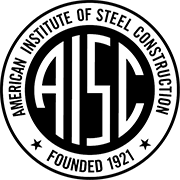University Programs
In This Section
Teaching Aid Development Program
Request for Proposals
Background and Motivation
For many years, AISC has worked with educators to develop teaching aids in the form of presentation slides, handouts, and videos. These tools have been made available to all faculty teaching steel design. In the past, these teaching aids have covered an array of topics, including member design, connection design, composite members, bolting, welding, construction management, and others. View current teaching aids here.
Recent feedback from educators has shown that there is interest in updating these teaching aids to be more useful and engaging, especially as more and more courses make use of videos, images, and web-based tools. There have also been suggestions to create more modular resources that are searchable rather than attempting to provide a complete course.
Proposals due August 31, 2020
We’re crowdsourcing our teaching aids, and we want your ideas!
AISC is now accepting proposals for teaching aids, including videos, presentations, design examples, team-based project guidelines, instructions for hands-on demonstrations, handouts, or anything you’d like to suggest. Proposals are welcome from any member of the steel community, including educators, consulting engineers, and industry professionals. AISC and the Partners in Education Committee will evaluate the proposals and provide funding in the form of a grant to successful proposals. All teaching aids will be made available free of charge to all AISC-member educators for use in their courses, with credit to AISC and the author. All teaching aids will become the property of AISC and can be used for educational purposes through a Creative Commons license. View a sample contract here.
The following topics are of particular interest for teaching aid proposals:
- Bridge design
- Construction management
- Member design
- Design for stability
- Seismic design
- System selection (e.g., case studies)
- Steel fabrication
Six grants were previously awarded as part of the 2019 Request for Proposals. View the list of recipients here.
Proposal Requirements:
- Proposals are due by August 31, 2020 by email to Kristi Sattler at sattler@aisc.org.
- Proposals should be no longer than 3 pages and should include the topic, format, learning objectives, project duration and schedule, budget, and justification for the project. Proposals should also describe the best method for the teaching aid to be incorporated into the class room. For example, it could be used as part of an existing lecture, a stand-alone lecture, lab, and/or homework assignment. The total schedule is not to exceed one year.
- Awards will be determined by November 15 and paid upon completion of the teaching aid.
- AISC/Partners in Education committee will provide a technical review of each teaching aid through one or two virtual meetings, depending on the scope of the project. AISC will also provide any required templates or content for teaching aids.
Grant Benefits:
- Grant amounts will range from $1,000 - $10,000.
- AISC expects to award up to 5 grants for teaching aids in 2020.
- AISC may invite the developer to present their work at a future educator session at NASCC (travel covered by AISC).
- The teaching aid will be announced an NASCC educator session and publicized in the monthly Educator Tip Sheet.
- AISC can also offer a letter of support for the developer to gain additional funding from their university or other entities.
Position on Overhead Expenses
AISC is a not-for-profit association with members from across the structural steel construction community, including producers, fabricators. The majority of the AISC members are engineers. We distribute our specifications free for their use. The primary goal of those specifications is the reliability of structures and through that the safety of the public.
Because AISC does not use the teaching aids for profit and because our work is performed in the interest of public safety, grants shall not be used for indirect cost and overhead expenses at educational institutions. AISC may choose to fund grants or gifts at its discretion.
